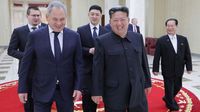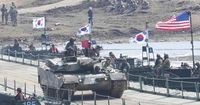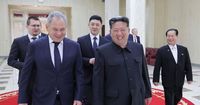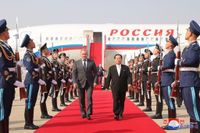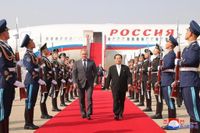SEOUL, South Korea (AP) — North Korean leader Kim Jong Un has reiterated his government’s unwavering commitment to supporting Russia’s war efforts in Ukraine, according to a report from North Korean state media. This declaration came during a significant meeting in Pyongyang with Sergei Shoigu, the secretary of Russia's Security Council, which took place on March 21, 2025. The two leaders engaged in discussions that primarily focused on the ongoing conflict in Ukraine, the ramifications of Moscow's dialogues with the Trump administration, and the security landscape of the Korean Peninsula.
This meeting follows a report from South Korea's National Intelligence Service (NIS) in late February, which indicated that North Korea appeared to have dispatched additional troops to Russia amidst heavy casualties suffered by its forces in the war. The intelligence community estimates that North Korea provided Moscow with significant military resources, having sent approximately 10,000 to 12,000 troops previously and a further contingent in recent weeks, which South Korean media estimates to be between 1,000 and 3,000 troops.
During the meeting, Kim stated, "My government will invariably support Russia in the struggle for defending the national sovereignty, territorial integrity and security interests.” This sentiment mirrors the broader strategic alliance between the two nations, reiterated by Shoigu, who expressed gratitude for North Korea’s solidarity on critical geopolitical issues, particularly regarding Ukraine.
Shoigu’s visit also included the delivery of a message from Russian President Vladimir Putin, who pledged to give “utmost attention” to the previously established agreements from their summits. Reports indicate that while specific new agreements were not disclosed, both leaders reaffirmed their intent to strengthen bilateral ties, particularly in military cooperation.
North Korea stands accused of supplying a broad range of conventional weaponry to Russia in its ongoing conflict, which many analysts suggest has resulted in reciprocal support from Russia, including economic and military assistance. This framework raises considerable concerns regarding the implications for regional stability, especially as military exercises and tensions escalate on the Korean Peninsula.
The geopolitical ramifications of the recent U.S.-Russia-Ukraine engagements were underscored by the limited ceasefire agreement reached by Ukraine and Russia on March 19, 2025, after discussions facilitated by President Donald Trump. This ceasefire, however, remains tentative as ongoing hostilities loom, complicating prospects for peace. The intersection of North Korea's alliance with Russia against the backdrop of U.S. military drills, characterized by North Korea as invasion rehearsals, signals a dangerously volatile situation.
Just ahead of Shoigu's visit, on March 20, 2025, North Korea conducted test-launches of new anti-aircraft missiles. This event marked the sixth weapons testing activity of the year, coinciding with the conclusion of the U.S. and South Korean joint military exercise known as Freedom Shield — a series of drills viewed by North Korea as provocative. Following the exercise, which was the first substantial military collaboration between the U.S. and South Korea since Trump's inauguration, North Korea responded with a series of ballistic missile launches.
As discussions between Kim and Shoigu unfolded, the regional and international implications of North Korea’s military developments cannot be overstated. Experts suggest that Kim’s administration is poised to leverage its support of Russia to extract maximum benefits, potentially ramping up military assistance while evaluating how long before Russia's conflict might come to a resolution.
Shoigu’s historical pattern of visits indicates a strengthened alliance; previous interactions have included 2023’s meeting, where Kim provided a personal tour of a North Korean arms exhibition, further demonstrating the deepening military ties. Furthermore, during a visit in September 2024, extended discussions revolved around expanding military cooperation.
Amidst these dynamics, the NIS has been closely monitoring troop movements and military exchanges between North Korea and Russia, further complicating existing tensions with South Korea and the United States. With reports emerging of North Korea receiving significant military support for its burgeoning relations with Russia, the situation poses significant risks not only regionally but on a wider geopolitical scale.
As the backdrop of these military alliances and exercises continues to evolve, the global community watches with bated breath, wary of escalation and the potential for further conflict. Considering the compounded challenges presented by North Korea's involvement with Russia, policymakers in Seoul and Washington are faced with pressing decisions on how to navigate these geopolitical waters.
In conclusion, the synergy between North Korea and Russia, highlighted by unwavering support for military collaboration and strategic commitments, underscores a complicated chapter in 21st-century international relations. The implications of this partnership are profound as they echo through the fabric of global security and diplomacy.
